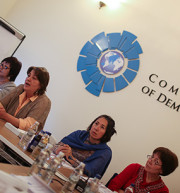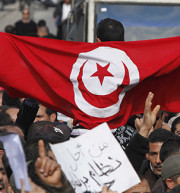
This page summarizes cases raised with Georgia by the Special Rapporteur between May 1, 2011, (when the Special Rapporteur took up his functions) and February 28, 2017 (the date of the last public release of communications). Communications are released to the public once per year. This page also contains observations on these communications and on responses received from Georgia. Communications and observations are divided into sections based upon which observation report they originally appeared. Each communication is referenced as urgent appeal (UA), allegation letter (AL), joint urgent appeal (JUA) and joint allegation letter (JAL) - the hyperlinks lead to these documents. This is followed by the date the communication was issued, as well as the case number and the State reply (also hyperlinked if available). Summaries and communications are published only in the language of submission (in the case of Georgia, English). First Report (May 1, 2011 to March 15, 2012) Joint urgent appeal, 20/06/2011. Case no. GEO 1/2011. State reply: 07/07/2011. Allegations of disproportionate use of force by law enforcement authorities to disperse a demonstration by opposition supporters. Observations The Special Rapporteur would like to thank the Government of Georgia for its response to his communication... Continue reading →

(WARSAW, Poland) – Political will is a major obstacle in ensuring civil society’s access to resources in many OSCE countries, according to participants in a May 7 regional dialogue organized in Warsaw by the Community of Democracies and the team of UN Special Rapporteur Maina Kiai. “It’s not a question of convincing through enough human rights laws or standards,” said one participant. Sometimes “they can’t be convinced.” The dialogue was the first event in a new two-year project focused on enhancing space for civil society and strengthening the right to access financial resources. The project was launched in February, and is being funded by the Swedish Ministry of Foreign Affairs. The May 7 Warsaw event looked at international human rights norms, standards and mechanisms to promote the right to freedom of association – and possible ways to strengthen these tools. More than 20 members of civil society from throughout the OSCE region participated. The focus on political will was central to the discussions, with one participant saying that talking about human rights norms to the government in his country was like “talking to the wall.” As a result, the road to ensuring civil society’s access to resources will require creative schemes and new ways of thinking, participants said –... Continue reading →

The Journal of Global Ethics has published an essay by Maina Kiai, in which he reflects on the first three years of his mandate, and the global state of assembly and association rights three years after protests exploded in Tunisia, sparking the Arab Spring. The essay, “Three years after Tunisia: thoughts and perspectives on the rights to freedom of assembly and association from United Nations Special Rapporteur Maina Kiai,” is available for free download to the first 50 people; subsequent access is by purchase only. Although Kiai’s mandate was created in late 2010 against the backdrop of shrinking space for civil society, a massive and growing global protest movement has grabbed most of the headlines since 2011. Kiai argues that the mandate has made a measurable impact – having helped raise awareness of repressive NGO laws, provided technical assistance to governments to strengthen assembly and association rights and developed soft law. But perhaps the most important work of the mandate, he argues, has been its contribution to a better understanding of just how important the rights to freedom of peaceful assembly and association are. “These rights satisfy people’s fundamental desire to take control of their own destinies,” Kiai writes. “They need to speak out, to work together... Continue reading →

Tbilisi, 13 February 2012 I would like thank the Government of the Republic of Georgia for inviting me to undertake a visit to the country, and for the cooperation that has been extended to me and to the members of my delegation before and during the conduct of the mission. I am most grateful to all interlocutors I have met, which include a large variety of senior government officials, the Public Defender and his Office, representatives of non-governmental organizations, labour unions, political parties, research institutes, activists and human rights defenders in Tbilisi, Kutaisi and Batumi. I am especially honoured as this is my first country visit since I was appointed UN Special Rapporteur in May 2011, and I am grateful to the Government of Georgia for its warmth and graciousness in inviting me. I was appointed right in the midst of the Arab Spring. The resolution that establishes my mandate asks me to “report on violations, wherever they occur, of the rights to freedom of peaceful assembly and of association, as well as discrimination, threats or use of violence, harassment, persecution, intimidation or reprisals directed at persons exercising these rights, and to draw the attention of the Council and the High Commissioner to situations of particularly serious concern”. The overarching... Continue reading →

TBILISI, GEORGIA - United Nations Special Rapporteur on the rights to freedom of peaceful assembly and of association, Maina Kiai, voiced alarm at the increasing climate of fear and intimidation against opposition parties, labour unions and members of non-governmental organizations. At the end of his eight-day mission to the country, Mr. Kiai warned that a number of restrictive legislative amendments adopted in late December 2011 by the Parliament of Georgia restricted the freedom of association. “It is clear that all these restrictive efforts have been put in place to deliberately prevent and restrict certain individuals from standing in the upcoming parliamentary and presidential elections,” the expert said. “The role of freedom of association in this context is to give hope to any political party that it can genuinely compete in elections. In the case of Georgia, there is an unequal political playing field.” “Georgia has come a long way since in 2003,” Mr. Kiai said, “however, there are a number of worrying signs that indicate that the focus on greater modernization and investment can easily derail the human rights achievements that were won through the painful process of the Rose Revolution. Given the way the current government was formed there is an expectation to respect the rights... Continue reading →

UN Special Rapporteur Maina Kiai undertook an official mission to the Republic of Georgia from Feb. 6-13, 2012, at the invitation of the Georgian government. The visit was carried out pursuant to his mandate to assess the situation of freedoms of peaceful assembly and association in the country. Mr. Kiai visited the cities of Tbilisi, Kutaisi and Batumi, and held meetings with Government officials, non-governmental organizations, trade unions, political party officials and representatives of the international community based in Tbilisi. Since the “Rose Revolution”, Georgia has experienced a remarkable period of reforms in many areas of public life. The Special Rapporteur considers, however, that these improvements should not be taken for granted. A climate of fear and intimidation against members of opposition political parties and civil society could seriously threaten this path. In the light of the 2012 parliamentary and 2013 presidential elections, more efforts to ensure protection of the rights to freedom of peaceful assembly and association should be made. The Special Rapporteur’s report was officially released on June 8, 2012, and was presented to the Human Rights Council at its 20th session in June... Continue reading →

The UN Special Rapporteur on the rights to freedom of peaceful assembly and of association, Maina Kiai, will undertake the first visit of his tenure to Georgia from 6 to 13 February 2012, at the invitation of the Government. "With elections planned for this year, Georgia has a wonderful opportunity to enhance the enjoyment of all human rights for all its citizens, and especially the rights to freedom of peaceful assembly and of association, which are the fulcrum for the enjoyment of democracy and economic development," said the independent human rights expert, who will travel to Tbilisi, Kutaisi and Batumi. “This mission will provide me with an opportunity to look in-depth at issues concerning freedoms of peaceful assembly and association in Georgia, by allowing me to collect first-hand information from the different actors concerned.” During his visit, the Special Rapporteur will meet with Government officials, representatives of the judiciary, legislature, media, civil society, as well as with the Public Defender. He will also meet representatives of the diplomatic corps, United Nations system and other international organizations. A press conference will be held on Monday, 13 February, at the Courtyards Marriott at the Freedom Square in Tbilisi, from 14h00 to 16h00, during which the... Continue reading →